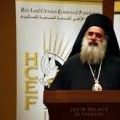Search the Community
Showing results for tags 'psalm'.
-
Psalm 40 ascribes the Psalm to David and describes the Lord hearing his cry for salvation and bringing him out of a pit. Below is the JPT translation with Hebrew: 1. For the conductor, of David a song. אלַמְנַצֵּחַ לְדָוִד מִזְמוֹר: 2. I have greatly hoped for the Lord, and He extended [His ear] to me and heard my cry. בקַוֹּה קִוִּיתִי יְהֹוָה וַיֵּט אֵלַי וַיִּשְׁמַע שַׁוְעָתִי: 3. And He drew me up out of the roaring pit, from the thick mire, and He set my feet upon a rock, He established my steps. גוַיַּעֲלֵנִי | מִבּוֹר שָׁאוֹן מִטִּיט הַיָּוֵן וַיָּקֶם עַל סֶלַע רַגְלָי כּוֹנֵן אֲשֻׁרָי: 4. He put a new song into my mouth, a praise to our God, so that many may see and fear, and trust in the Lord. דוַיִּתֵּן בְּפִי | שִׁיר חָדָשׁ תְּהִלָּה לֵאלֹהֵינוּ יִרְאוּ רַבִּים וְיִירָאוּ וְיִבְטְחוּ בַּיהֹוָה: I. By ascribing the Psalm to David, the Psalm makes itself implicitly Messianic. It suggests that David, whom the Tanakh calls the "Sweet Singer of Israel", wrote the Psalm, sang it, or that it otherwise belonged to him directly. The Psalm becomes Messianic in the eyes of the Tanakh's audience, because the Tanakh repeatedly refers to the Messiah allegorically as "David". (eg. Isaiah 55, Ezekiel 34 and 37, and also in the books of Jeremiah and Hosea). The Psalm is also Messianic due to verse 4, where it says that his new song brings "many" to trust in the Lord. The "many" or "multidudes" in the Tanakh is commonly a reference to the "many nations" (eg. in Isaiah 52-53). Turning the many nations to the Lord is a duty of the Messiah (eg. in Is. 11). II. The Psalm's reference to the Lord bringing him out of the roaring pit and mire and onto a rock is a reference to resurrection. This is because the "pit" in the Psalms refers to the state of physical death. By saying that the Lord drew him out of the pit, it means that David was in that pit of the state of death and then that the Lord drew him out of it. One scholar notes how "the Pit" was a reference to the state of death: L. Bronner says something similar about the concept of the pit in Psalm 16: III. Verse 7 is interesting, because it says the Lord gouged ("Karah") ears for him. Here is the JPT: You dug (karah) ears for me אָזְנַיִם כָּרִיתָ לִּי עוֹלָה This is relevant because earlier in Psalm 22, in some text variants, it says that the narrator's enemies gouged (Hebrew: karu; Greek LXX: oruksan) his hands. Verse 7 about the gouging of the ears shows that David is able to use gouging (karah) as a verb metaphorically describing gouging performed on one's body. The gouging of the ears therefore in Psalm 40:7 opens up the possibility that David is using a similar expression of gouging the hands in Psalm 22. Psalm 40 itself has major elements in common with Psalm 22. They both describe the narrator as being "encompassed" by evil, hunted by enemies, being in a state of death (Psalm 22 has it "the dust of death"; Psalm 40 has "a roaring Pit" and "thick mire"), as crying for help, as the Lord saving him, then the narrator praising the Lord to the assembly, and the righteous praising the Lord: 10. I brought tidings of righteousness in a great assembly. Behold, I will not withhold my lips, O Lord, You know. יבִּשַּׂרְתִּי צֶדֶק | בְּקָהָל רָב הִנֵּה שְׂפָתַי לֹא אֶכְלָא יְהֹוָה אַתָּה יָדָעְתָּ: 11. I did not conceal Your charity within my heart; I stated Your faith and Your salvation-I did not withhold Your kindness and truth-to a great assembly. יאצִדְקָתְךָ לֹא כִסִּיתִי | בְּתוֹךְ לִבִּי אֱמוּנָתְךָ וּתְשׁוּעָתְךָ אָמָרְתִּי לֹא כִחַדְתִּי חַסְדְּךָ וַאֲמִתְּךָ לְקָהָל רָב: 13. For countless evils have encompassed me יגכִּי אָפְפוּ עָלַי 15. May those who seek my soul to destroy it be shamed and embarrassed together; may those who seek to harm me retreat and be humiliated. טויֵבֹשׁוּ וְיַחְפְּרוּ | יַחַד מְבַקְשֵׁי נַפְשִׁי לִסְפּוֹתָהּ יִסֹּגוּ אָחוֹר וְיִכָּלְמוּ חֲפֵצֵי רָעָתִי: 16. May they be bewildered afterwards because of their shame, those who say about me, "Aha! Aha!" טזיָשֹׁמּוּ עַל עֵקֶב בָּשְׁתָּם הָאֹמְרִים לִי הֶאָח | הֶאָח: 17. All who seek You shall exult and rejoice; those who love Your salvation shall constantly say, "May the Lord be magnified." יזיָשִׂישׂוּ וְיִשְׂמְחוּ | בְּךָ כָּל מְבַקְשֶׁיךָ יֹאמְרוּ תָמִיד יִגְדַּל יְהֹוָה אֹהֲבֵי תְּשׁוּעָתֶךָ: IV. One of the controversies about seeing this Psalm as Messianic however, is that in the course of the Psalm, it talks about the narrator's "iniquities". One possible explanation is that these iniquities are those that the Messiah is bearing on behalf of others, as the Messiah is described as doing in Isaiah 53. For more information, see: The Uses of the Old Testament in the New, By Walter C. Kaiser, https://books.google.com/books?id=k7ZKAwAAQBAJ&printsec=frontcover&dq="psalm+40"+messianic+OR+messiah+OR+resurrection&hl=en&sa=X&ved=0ahUKEwj6-5LZ8eXRAhVLwiYKHd_tB7MQ6AEIlgMwRQ#v=onepage&q="psalm 40" messianic OR messiah OR resurrection&f=false
- 3 replies
-
- resurrection
- messiah
-
(and 2 more)
Tagged with:
-
Today I found one really shocking issue. Was checking psalms, you know how they sound in Latin, maybe learn something, and found very strange issues with Psalm 82. Here just look: http://www.biblestudytools.com/parallel-bible/passage/?q=psalm+82&t=vul&t2=niv 19 lines vs. 8!? You do not need to know Latin to realize that something is terribly wrong with those "translations". All comments are really appreciated, but I really would like to hear from person who can read Latin and English versions. Please state so if you can.
-
Videos by Omegaman 3.0 This one needs no real explanation or forward, (other than to say that mostly, this is about the incredible messianic prophecy of Psalm 22) the videos explain themselves best. Here is part 1: Here is part 2: Part 3 Part 4 - Gospel in a Bug


